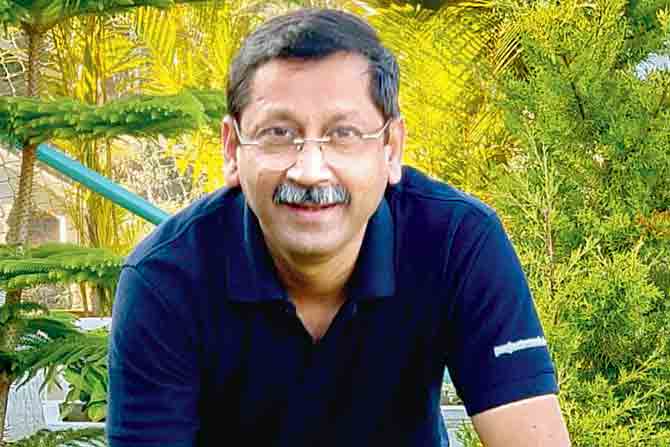For most of us, isolation is an irritant and the lockdown, a logistical hurdle. For those struggling with mental health conditions, it feels "like being in a room that's shrinking every day around me"

Illustration/ Uday Mohite
Ten minutes before our scheduled telephonic chat with Tina Fernandes, this writer received an SOS from her on WhatsApp: "Will he declare an Emergency?" Fernandes had discovered on social media about Prime Minister Narendra Modi's address to the nation for the second time in less than a week. The last time he had imposed #JanataCurfew, a 14-hour national lockdown. Now, having read a spurious "news" story online, which listed how India was readying for an Emergency, Fernandes was expecting something more dreadful.
Fernandes, 32, admits that this state of uneasiness, has found permanent room in her mind, especially since she started working from home two weeks ago.
The Mumbai-based content writer, was diagnosed with mixed anxiety-depressive disorder (MADD) in 2016, while she was in Europe to pursue a degree. The symptoms fluctuated from elevated moods of extreme happiness and confidence, to unwarranted stress, where she'd experience shortness of breath and severe palpitations. During these phases, she'd struggle to get out of bed. It was only after seeking psychiatric help that she developed a routine, which included yoga and long walks in the park, every day. "It helped me calm down."
Fernandes returned to Mumbai last year, and got a job with a media house in Lower Parel. Here, she found another life-saving routine—fixed working hours. This meant that she woke up on time, ate meals at regular intervals, and slept before 10 pm. "I was in a happy place," she shares. And then, the corona scare struck, forcing the government to implement strict measures to keep the crowds in check. Nothing is the same.
Fernandes, like others coping with mental health conditions, finds herself struggling. Social distancing and isolation, which appear to be the only weapons to currently fight the pandemic, are taking a toll. "Suddenly, it feels like [I am trapped in] a room, which is getting smaller with oxygen depleting by the day," says Lekha Rane, an HR professional, diagnosed with clinical anxiety.
Twenty-three-year-old Sanjana S is pursuing a masters degree in education at a university in Bengaluru. "I have generalised anxiety disorder, which means that everything and anything can make me anxious," says Sanjana, who hails from Jaipur, and lives alone, away from home, in an apartment in the city. Her college shut down on March 6, and students were requested to leave. "My parents too, insisted that I return home. But anxiety kicked in, and the very thought of leaving my house and boarding a flight, made me panic."
With all her friends having left, Sanjana has spent most of the month, locked up in her flat. "Every day is a challenge. There is no routine, so, I am constantly thinking about my parents, who are old and vulnerable to the illness. It has made me a wreck," she says.

Mumbai-based Rachana Iyer, who heads corporate social responsibility at a leading financial institution, lives with a mental health condition that "manifests itself in extreme mood swings, bouts of depression and low distress tolerance". Iyer has launched a peer support group on WhatsApp called, The Mind Knows No Lockdown
Having social support can make it easy, feels Keenan Dias, 35, a Mumbai-based sales professional. Diagnosed in January last year, with bipolar II disorder, Dias's symptoms range from mild mania to depressive episodes. Since his diagnosis, Dias hasn't had a single episode, but the lockdown means that his work and gym schedules have gone for a toss. "This can immediately affect the mood. But, because I live with family, I have been able to cope. In fact, I had an opportunity to work abroad, but with my condition, I need support to keep myself together. Now that I do, I can bond better." Dias also keeps a mood diary where he writes his thoughts down. Ever since he started practising social distancing, he has been writing letters to friends, too. "Of course, you need to take your medication on time. You can't afford to skip, especially when everything around seems to be falling apart."
But, access to medicines, is the other hurdle. Earlier this week, mid-day had reported that because psychiatric patients didn't have fresh prescriptions from their doctors, they were struggling to get medicines at drugstores. While the Maharashtra Medical Council (MMC) has allowed for sending prescriptions online, psychiatrists say chemists need instructions from the Food and Drug Administration (FDA) to accept soft copies. Last week, American health organisation National Alliance on Mental Illness (NAMI), in its online resource guide to cope during the pandemic isolation, had suggested that mental health care providers give 90-day supplies versus a 60 or 30-day supply to their patients.
Vrushali Reddy, 23, a data analyst from Gurugram, has bipolar and borderline personality disorder, which impacts the way she perceives herself. Reddy confirms that she has faced a shortage of medicines, but adds, "with my condition, the thought of stepping out to buy medicines too, can be terrifying. The medication needs to be taken daily, and at a particular hour."
She eventually did go to the drugstore this week. "Here, the problem again is that chemists tend to be wary of giving you medicines with higher doses without a prescription, because there is always the risk of overdose."
But it's not all bleak. Health practitioners, non-profits and counsellors have come together to facilitate helplines, online therapy sessions and support groups.
Mumbai-based Rachana Iyer, who heads corporate social responsibility at a financial institution, lives with a condition that "manifests itself in extreme mood swings, bouts of depression and low distress tolerance". Diagnosed two years ago, Iyer, a mental health advocate, has been working on keeping herself mentally and physically fit. "I am a social person and my work involves a lot of travel across India to urban and rural areas," she says. It has now come to a halt. "I also find it hard to be cooped up in the house; it has brought my exercise routine at the gym to a standstill. Initially, I used to be anxious, angry and distressed with what is happening around us," says, Iyer, 30. She has learnt to channel the pain productively.

Naina Shahri, counselling psychologist and associate at The Alternative Story
Last Wednesday, Iyer launched a peer support group on WhatsApp called, The Mind Knows No Lockdown. "The need for it has risen from my own experience of social isolation. All of us are facing our own peculiar challenge during the lockdown. The purpose of this social media challenge is to support each other despite the social distancing, to get more in tune with ourselves. I see this as a chance to go inward, to reflect and adopt good habits and practices. There is no big or small goal," she says.
In the group, which currently has 21 members from across the globe, including Pakistan, Nigeria and Australia, every individual shares their goals for each of the 21 days, sharing updates on the progress at the end of every day. "From hydrating regularly, to being mindful of our breath, to getting exercise in, to getting good sleep and not binge eating—all of these goals are important and this is a good time to define what we want to achieve in the 21-day lockdown. Of course, transformation and mind mastery takes time, but we can surely use the forced isolation to push ourselves to let our mind overpower anxiety, the negative voices and sadness," hopes Iyer.
The group has a rule, though. Members can't discuss negative news, rumours, share forwards or pass judgements on each other's goals. "All of us already have too many groups we are part of; there's enough clutter. The motive was to create a safe and sacred space for all of us to support each other."
Mental health service, The Alternative Story, which provides offline as well as online counselling, has moved its therapy online, for now. Last Friday, Paras Sharma, the founder and mental health professional, hosted an online meet-up, where he discussed what it means to live in quarantine. Naina Shahri, counselling psychologist and associate at The Alternative Story, says, that there has been an increase in the number of enquires for therapy, since the time people were asked to self- quarantine. "People are generally feeling anxious. There's uncertainty over what the next few weeks will look like. People are unsure if they should travel home or stay put. Most of us are afraid how we will get through the lockdown without having enough groceries or medicines," she says.

Shishir Joshi, CEO, Project Mumbai, has launched a 12-hour helpline
Surabhi Dand, a psychotherapist practising alternative healing therapy, has been conducting guided healing meditation sessions on WhatsApp, with a range of messages and audiobytes. "We sit at our different locations and collectively meditate at 10 pm. It's helping people keep the balance and strengthen their self-esteem. Negative feelings and fear impact immunity."
One of the initiatives that has taken off in a big way is a 12-hour helpline service initiated by Shishir Joshi, CEO and founder of non-profit, Project Mumbai. The Free Counsellors on Call facility comprises a team of 50 trained counsellors, working from 8 am to 8 pm across languages, including Marathi, Hindi, English, Gujarati, Malayalam, Punjabi and Kannada. Joshi launched the non-profit 18 months ago, with a mental health programme in BMC schools. "So, this [mental health] wasn't alien territory. It's been one of our passion spaces. Since I am on the BMC commissioner's task force, I thought let me look at the gaps. I realised that if I, personally was experiencing stress, what would the most vulnerable be feeling right now." Each phone call lasts 15 minutes, and each counsellor works on a six-hour shift. "It's not a helpline for coronavirus. We are here for mental wellness, so our job is to offer solutions. We will continue with this, till the situation calls for it."
Malvika Fernandes, a counsellor who is leading the mental health programme for Project Mumbai, says she receives an average of 15 calls, daily, some from the US from young Indians who are worried about their elderly parents back home. "Right now, we are acknowledging everybody's feelings. There will be people who are severely affected, and others, who are just doing okay. Any and every feeling is valid and legitimate." On the few occasions, when Fernandes feels that the callers need professional therapy, she passes on referral numbers from their database.

Surabhi Dand, certified pranic healer and psychotherapist, conducts guided healing meditation sessions on WhatsApp at 10 pm, every day
Dr Kersi Chavda, practising psychiatrist and consultant at Hinduja National Hospital, says this is the time to be "united psychologically". He says, "Attempt to improve relationships, and do see a psychiatrist if there are psychological issues running in the family, rather than paying heed to a lot of nonsense that flies around on social media."
Shahri says that the times are such, that people are going to feel nervous and lost. "Witnessing widespread illness, death and isolation are conditions that can naturally bring up questions about human existence. Many people I have spoken to are experiencing existential angst. I want to tell them that this is a shared experience and nobody is alone in feeling so."
Some names have been changed on request.
Six steps to mental fitness
1 Switch off from bad news: If you are feeling overwhelmed by the news, disengage from it for a while. Switching off your phone and television and doing an activity that requires your attention and engagement will help.
2 Stay connected with friends, relatives: If you have WiFi or Internet, video call friends and check about how they're doing. Tell them what you've been up to.
Isolation very often is ground for mental health concerns to grow.
3 Have a routine: Today is characterised by uncertainty, and one way to feel in control is to know how your day looks like. It is natural for schedules to get disrupted when we are at home. In this process, our sleep and eating routines might be influenced, which cumulatively impacts our mental well-being.
4 Set boundaries with work: Working from home can spill into your time to doing other things. We may feel we have more time since we are saving on commuting time, but it's on the contrary. This might lead to exhaustion.
5 Divide house work duties: Many women are exhausted because household chores are assumed to be their responsibility, and is aggravated because house helps are not coming to work. Division of duties will help members fit in responsibilities into their daily schedule.
6 Engage in self-care: This is a term that is often discussed, and is essential to these times. Self-care can look different for different people. Some people might like journaling, some may take to a form of art to express emotions; for some it might be working out. Pick whatever you like to do.
Naina Shahri, counselling psychologist and associate at The Alternative Story
Where to get help
Free counselling: Non-profit Project Mumbai's counsellors are available for WhatsApp calls in various languages.
For helpline numbers, visit projectmumbai.org
Online therapy: The Alternative Story is currently providing individual and organisational well-being services, online.
Visit alternativestory.in
50
The number of helpline numbers made available by Project Mumbai daily in multiple languages
Catch up on all the latest Mumbai news, crime news, current affairs, and also a complete guide on Mumbai from food to things to do and events across the city here. Also download the new mid-day Android and iOS apps to get latest updates
 Subscribe today by clicking the link and stay updated with the latest news!" Click here!
Subscribe today by clicking the link and stay updated with the latest news!" Click here!





